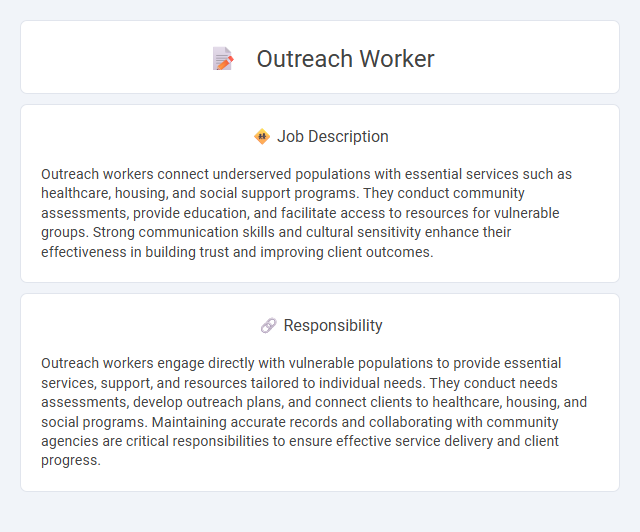
Outreach workers connect underserved populations with essential services such as healthcare, housing, and social support programs. They conduct community assessments, provide education, and facilitate access to resources for vulnerable groups. Strong communication skills and cultural sensitivity enhance their effectiveness in building trust and improving client outcomes.
Outreach workers frequently engage with individuals experiencing homelessness, addiction, or mental health challenges, requiring strong emotional resilience and empathy. People who thrive in high-stress environments and possess excellent communication skills are likely to find this role suitable. Those prone to burnout or discomfort with unpredictability may struggle to meet the job demands effectively.
Qualification
Outreach workers require strong interpersonal skills and a background in social work, psychology, or community development, often supported by a bachelor's degree in these fields. Certifications in mental health first aid or substance abuse counseling enhance their qualifications, enabling effective engagement with diverse populations. Practical experience through internships or volunteer roles in community organizations is critical for developing the ability to assess client needs and connect individuals to appropriate services.
Responsibility
Outreach workers engage directly with vulnerable populations to provide essential services, support, and resources tailored to individual needs. They conduct needs assessments, develop outreach plans, and connect clients to healthcare, housing, and social programs. Maintaining accurate records and collaborating with community agencies are critical responsibilities to ensure effective service delivery and client progress.
Benefit
Outreach worker jobs likely offer significant benefits such as opportunities for meaningful community engagement and personal fulfillment through helping underserved populations. These roles often provide valuable experience in social services, enhancing skills in communication, empathy, and problem-solving. Workers may also benefit from flexible scheduling and supportive work environments aimed at promoting both professional growth and well-being.
Challenge
Outreach workers likely face the challenge of engaging hard-to-reach populations who may be skeptical or distrustful of assistance programs. It is probable that managing limited resources while addressing diverse community needs requires significant adaptability and problem-solving skills. Overcoming communication barriers and building trust within marginalized groups might frequently test their resilience and patience.
Career Advancement
Outreach workers gain valuable skills in community engagement, communication, and crisis intervention that open pathways to advanced roles in social work, public health, or nonprofit management. Pursuing certifications such as Certified Outreach Professional (COP) and gaining experience in program development can accelerate career progression. Many outreach workers transition into supervisory positions or specialize in areas like mental health advocacy or educational outreach to expand their professional opportunities.
 kuljobs.com
kuljobs.com